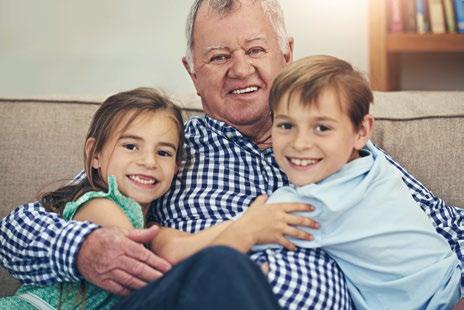






Dear Friends,
As we embrace the vibrant season of fall, Hospice of the Chesapeake continues celebrating 45 years of dedicated service to families, creating meaningful moments, and evolving to meet the needs of people we serve.
While much has transformed during these decades, our core commitment of partnering with people affected by advanced, serious illness to live each day with meaning and hope remains steadfast. We are equally dedicated to caring for our healthcare team members and advancing our services with innovative approaches to ensure we meet current needs and anticipate future ones.
In 2023, we opened the Burnett Center for Hope and Healing in Prince Frederick. This new center is a beacon of possibility, inviting the community to explore renewed hope and find healing. We believe everyone can heal, even when they can’t be cured. This approach will span across our programs and eventually our entire service area, including exciting initiatives designed to support patients and caregivers impacted by dementia. Stay tuned for more developments in 2025!
For the next three years, a newly approved organizational strategic plan that incorporates an expanded vision will guide us. As a not-for-profit organization, we are devoted to putting patients and families first by investing in a forward-thinking approach to serve future generations.
Thank you for your unwavering support and dedication to our mission. Your contributions and advocacy are invaluable as we continue this journey together. Please join me at our community events. Visit our website for more details.
With heartfelt gratitude,
Rebecca Miller, MSW Chief Executive Officer
Our New Vision: Caring and helping people and their families living with progressive, serious illness to reimagine hope—living every day with intention and peace—while ensuring our not-for-profit organization is here to serve future generations.

Hospice of the Chesapeake answers to your family, friends, and neighbors in Anne Arundel, Calvert, Charles, and Prince George’s counties, rather than a for-profit investment company or larger health care system. That translates into care and support for our community, a value embedded in our 45 years as a not-for-profit, independent, community hospice. Our organization will never deny a patient or family because of inability to pay.
On your terms, your Hospice of the Chesapeake care team works with you to create plans specific to patient and family needs and goals. Because it’s about having that choice.
ON THE COVER: Daniel and Marie Burgess hug Harvey and baby Hudson in their last family photo with Harvey in July 2015. Since then, Marie and Daniel welcomed their third son, Henry.
Forget stacks of paper, endless signatures, and forms to read on the spot. Thanks to donor support, a user-friendly digital admission system at Hospice of the Chesapeake launched in January 2024 to ease the process.
Here’s how it works: Before the nurse even arrives, patients and families receive a secure link to review and complete documents at their pace. This thoughtful approach means when the care team visits, the focus remains on patient care goals and family needs, not paperwork.





“We’re transforming the experience to prioritize what truly matters,” says Lindsey Shives, Manager of Health Information Management. “Patients and families have time to read through information, consider any questions, and share documents with loved ones without feeling rushed.”
With nearly universal adoption, this digital system also consolidates healthcare information, such as consents and MOLST (Medical Orders for Life-Sustaining Treatment) forms and hospice resources, in one easily accessible place. Nurses will complete the process in person for those who prefer assistance.
“It’s a gamechanger for people we care for,” Shives says, noting it streamlines admissions, giving families more precious time together. “This is exactly the care I would want for anyone in my family.”
How do you thank a nurse at end of life? Odenton resident Steven Moore can tell you. His wife, Marianne Moore, Ph.D., RN, APRN, CNM, was one of the first patients at Hospice of the Chesapeake to have a tribute from the Maryland Nurse Honor Guard, founded this year.
“Nurses usually don’t receive recognition this way. The service was beautiful,” he says. The ceremony at the Rebecca Fortney Inpatient Care Center in July included a reading, and presentation of a white rose and blanket. Honor Guard presenters wore traditional navy capes and nursing hats.

the Maryland Nurse Honor Guard.
“Marianne wanted to be a nurse since she read the Sue Barton, Student Nurse,” says Steven Moore, an Air Force veteran. She worked in labor and delivery, gynecology, and midwifery, and was a nurse-educator, most recently at Bowie State University. Though Marianne was nearing the end, he says, he believes she knew of the honor in recognition of a career she cherished.
The Hospice of the Chesapeake team coordinated the service with the Guard, which recognizes RNs, LPNs, and advanced practice nurses with a living tribute at end of life, and a memorial when a nurse passes away.
From unparalleled care for patients and families to technological advances, your gift lls gaps insurance doesn’t cover. hospicechesapeake.org/giving or 443-837-3385.
When Marie Burgess talks about her son Harvey’s four years on earth, she remembers his playful spirit. Though he couldn’t talk or walk, she says, “Harvey would follow with his eyes and wiggle his body with excitement.”
Born six weeks premature, Harvey’s NICU stay was followed by multiple diagnoses. At one point during Harvey’s infancy, he had 25 specialists overseeing his care.
“We were living in hospitals, taking shifts while we worked,” she says. At every turn, they sought answers, advocating for their little boy. “We were in a state of constant hypervigilance.” Finally, after years of exhausting effort and countless hospitalizations, there was nothing more to do for Harvey. It was time to focus on living peacefully and being together.
The Burgesses contacted Hospice of the Chesapeake for help. “I wish I knew about pediatric hospice earlier,” she says. “Hospice was a breath of fresh air. They gave us a second chance at enjoying our sweet son.”

The team oversaw Harvey’s care, so the family didn’t need to spend their short time left managing his physical symptoms, arranging medical equipment, or even dealing with medications from a distant specialty pharmacy. Instead, she says, they had the gift of family.
“The nurses told us, ‘You are Harvey’s team. You do what matters most to you, and we’ll do the rest.’ It was an incredible relief.”
The two months in hospice gave the Burgesses moments they craved. “The hard part was already happening. Hospice allowed us to be together and make memories as a family.” Mom, dad, and baby brother Hudson were by Harvey’s side when he took his last breath in September 2015.
For two years, the Burgesses attended a Chesapeake Life Center support group for parents who lost a child. “It was important to me after Harvey died to connect with other parents who knew what this was like,” she says. “It was immensely helpful to be understood by other parents like me and learn how to navigate a world without Harvey in it.” The experience led Burgess, a high school guidance counselor, to return to school for a clinical licensure in grief therapy.
With time, her life has come full-circle. Today, she helps other families as a volunteer support group leader at Hospice of the Chesapeake and as a volunteer at Camp Nabi, a grief camp for children and teenagers.
On her blog, Burgess writes: “Harvey, which means ‘battle-ready,’ fought more wars within his own body than most of us will face in a lifetime. He did it with a strength and grace that we can only aspire to.” Her work, she believes, honors Harvey’s “battle-ready” memory as she guides other parents and children through their grief journeys.
Your gift helps families find strength after heartbreak. Get in touch at 443-837-3385 or visit hospicechesapeake.org/giving



For Nicole Roy-Harrison and her young sons, one path toward healing after the loss of their beloved husband and father is through a surprising source: horses. “My husband Jon, 36, died suddenly and tragically in 2023,” she says. “Grief over this loss has been challenging for all of us.” The family has found comfort through several Chesapeake Life Center grief programs, including visits to Maryland Therapeutic Riding (MTR) in Crownsville, MD.
Made possible only through donor support, this soothing approach includes brushing, talking to and painting on horses instead of horseback riding, to express feelings and build confidence. “Counselors guided us to think about how our interactions with horses made us feel about Jon,” says Roy-Harrison.
Equine (or horse) therapy taps into the animal’s innate sensitivity to human emotions, body language and non-verbal cues. “Interactions with gentle, intuitive horses help people rebuild trust and process difficult emotions,” explains Faith Fitzgerald, D.Min., director of community health programs. Participants do not need to have had a loved one in hospice.
“Yes, it was emotional, but we left feeling lighter and with a smile on our faces,” Roy-Harrison adds. “It was wonderful to experience this as a family. I know our Jon would have loved it.”
Ask Reuben Collins II, Esq., about his dad and he’ll offer up stories. How his Depression-era father, a man of faith, grew up in a segregated world. How after earning a bachelor’s degree in education, he taught generations of students. And then, after retirement, how he taught barbering at a nearby prison, helping inmates become licensed barbers.
A lifelong Charles County resident, Collins, President, Charles County Board of Commissioners, will tell you more: How his dad cherished his Omega Psi Phi fraternity brothers. And that his dad was a Marine during the Korean War. And how his dad loved family fiercely.
And then he’ll tell you how Hospice of the Chesapeake honored a man at the end of a life filled with service to family, faith, and community.
“We could not have done this alone,” he says. “Hospice of the Chesapeake being there and seeing him through the transition is something I’ll never forget.” Collins cherishes the Honor Salute, in recognition of his father’s military service and how it resonated with his son, serving in the Air Force. “It was an eye-opening experience that impacted me, my wife, and my children.”
The hospice team guided his family, helping them understand what was happening and what was ahead. “Hospice allowed for a safe, comfortable environment for my dad. He was exactly where he wanted to be—at home with us.”

As one might expect of a certain generation, his father wasn’t one talk about his feelings. “On that last day, we were in the room—all of us, my wife, the kids.” Collins pauses. “And then my dad whispered, ‘I love you.’”
“You don’t forget things like that.”
David Henry Collins passed in March 2023, at 93 years young.

John Richards* never met a stranger and was always ready for a party. So, it’s no surprise the music-loving, motorcycle-riding 55-year-old wanted to hear his favorite songs during his last days. His song of choice? Highway to Hell by AC/DC.
“He loved hard rock, the louder the better,” says music therapist Chrissy Cotsalas, LPMT, MT-BC. “We cranked it up. He was screaming the song and banging a tambourine. He loved it.” Richard’s family loved it, too.
When he passed away hours later, his family thanked her for those moments of joy —ones they will never forget. “They said it was exactly who John was and how he lived.” From hard rock to folk music and children’s songs to hymns, music therapy relieves pain and reduces stress, especially in the hospice setting. This spring, a music therapy pilot program with Annapolis Music Therapy brought Cotsalas to assisted and senior living communities and nursing homes. The donor-funded program helped nearly two dozen families.
“Music is a powerful way to connect to childhood memories,” she says. “We’ll sing Take Me Out to the Ballgame and add the patient’s name. Or we’ll sing a portion and often the patient, who may not have spoken earlier, will complete the lyrics.”
“Music connects to memory and well-being,” agrees Alena Dailey, CDP, Integrative Arts & Chesapeake Life Center manager. “Musical memories of patients with dementia remains relatively unaffected,” she says. “A song from a person’s youth can transport them to a familiar place, bringing happy, warm thoughts.”
It works for all ages, too. At Camp Nabi, children and teens joined interactive drum and percussion circles during a grief session about their loved ones. “Music provided another opportunity to express their loss,” says Dailey.
As the Baby Boomer generation ages, there are more requests for 1970s and 1980s songs. “I played Eye of the Tiger for a patient who was agitated,” says Cotsalas. “I sang gently until she fell asleep.”
Unfortunately, while research-based music therapy is effective, Medicare and private insurers do not cover it for any need, including dementia care and grief support. Your gift today allows Hospice of the Chesapeake to offer music therapy to more patients and families going forward.
*Name changed for privacy
Your generosity translates into healing and hope today and tomorrow. hospicechesapeake.org/giving or 443-837-3385
When you become a corporate partner with Hospice of the Chesapeake, you invest in the care of our families, our friends, our neighbors, and our community.
Your sponsorship of beloved and new signature events and county-specific programs puts you in front of donors, business leaders, and community groups. From a black-tie event and fashion show to a golf tournament and race, check out all that’s in store. You’ll connect throughout Anne Arundel, Calvert, Charles, and Prince George’s counties. Benefits include complimentary event tickets to popular events; access to pre-receptions; acknowledgment in invitations, print and digital outlets; podium recognition; signage at events; advertising, and more.
Now is the perfect time to invest in corporate sponsorship with Hospice of the Chesapeake.
Scan to find your marketing fit.

How can you help older adults living with complicated illnesses? One way is to support Hospice of the Chesapeake through Community Investment Tax Credits (CITC), a program of the Maryland Department of Housing and Community Development.
Hospice of the Chesapeake has been awarded 2024 tax credits to enhance services for underserved older adults facing complicated illnesses such as dementia. As a Maryland resident or business owner, your donation of $2,500 or more will result in a 50% tax credit on your Maryland State tax liability. For example, a $2,500 donation will result in a $1,250 direct state tax reduction. These tax credits are in addition to other deductions.
The CITC program provides an opportunity for individuals and businesses to reduce their tax liability, help Hospice of the Chesapeake care for older adults, and make an impact on community needs. The deadline for 2024 contributions is December 1, 2024.
Learn more: Contact Chief Advancement Officer Shauna Chabot at 443-837-1503 or email schabot@hospicechesapeake.org.
This article is for informational purposes only. Individuals and businesses considering CITC donation should consult with their tax professional for information about specific tax benefits, based on their situation.
With planning, you can make the gift of a lifetime. Thoughtful gifts like yours to Hospice of the Chesapeake strengthen and nurture patients, families, and our community for years to come.


Donor Advised Fund
Set-up this charitable giving checking account to support charities like Hospice of the Chesapeake.

Qualified Charitable Distribution
70 ½ or older? Direct your required minimum distribution to charity as part of your IRA strategy.


Give through your life insurance and provide comfort and care for others.

Stretch your charitable dollars in an easy, tax-effective way.
Take advantage of potential tax benefits and the ease of digital currency transactions. Contact us today!
ones and causes you care about into the future.
Join our Circle of Care Legacy Society by including Hospice of the Chesapeake in your will. Learn more at hospicechesapeake.planmygift.org/wills-and-living-trusts or call 443-837-3385. Scan here for your smart giving website.
Make a one-time contribution
Become a monthly donor
Remember a loved one with a memorial gift
Give stocks, bonds, or cryptocurrency
Purchase an inscribed brick on campus

John & Cathy Belcher Campus
90 Ritchie Highway • Pasadena, MD 21122 410-987-2003
hospicechesapeake.org/giving
443-837-3385

Although her dad is gone, Jayla will never forget him. During Camp Nabi in August, children and teens had traditional camp activities, like art, blended with grief support. The weekend overnight camp, made possible by donors like you, helps children as young as 6 years old heal after the death of a loved one.